Stress in working adults and implementing suitable coping strategies
> Shliew003
Many spa places convince us to spend thousands by selling the idea that our minds and bodies are interlinked, relieving stress from our bodies gives you good mental health.
Well, they are not wrong. Stress symptoms affect thoughts and feelings, and the way you act. Failure to identify stressors and tackle them can lead to stress-related diseases.
In Tough Times, Spas Appeal to Stress Relief. “No?”
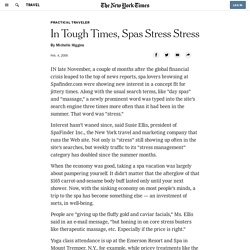
The pitch continues. “Then book your healthy, revitalizing getaway today and let us help you re-establish your balance. In times like these, nothing — nothing at all — is more important than taking care of yourself and on focusing on what really matters: Health, hope, love and a tranquil mind.” Image During past economic downturns, Mr. Of course, a little financial incentive also helps. Rancho La Puerta, just over the California border in Tecate, Mexico, explains its decision to keep prices at 2008 levels — starting at $2,795 a person for seven nights, double occupancy — this way on its Web site: “We feel that in these tumultuous times a destination spa vacation is more important than ever.” Miraval’s Authentic Remedy package, which starts at $399 a person a night — more than 40 percent off regular rates — includes extras like organic wine tastings and cooking classes.
After Work Stress Relief with 3 Unique Spa Treatments!
Stress, your worst enemy that deteriorates both your emotional and physical condition.
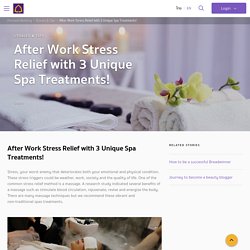
These stress triggers could be weather, work, society and the quality of life. One of the common stress relief method is a massage. A research study indicated several benefits of a massage such as stimulate blood circulation, rejuvenate, revive and energize the body. There are many massage techniques but we recommend these vibrant and non-traditional spas treatments.
Stress, Illness and the Immune System. By Saul McLeod updated 2010 The immune system is a collection of billions of cells that travel through the bloodstream.
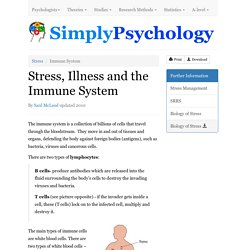
They move in and out of tissues and organs, defending the body against foreign bodies (antigens), such as bacteria, viruses and cancerous cells. There are two types of lymphocytes: B cells- produce antibodies which are released into the fluid surrounding the body’s cells to destroy the invading viruses and bacteria.T cells (see picture opposite) - if the invader gets inside a cell, these (T cells) lock on to the infected cell, multiply and destroy it. The main types of immune cells are white blood cells.
When we’re stressed, the immune system’s ability to fight off antigens is reduced. The stress hormone corticosteroid can suppress the effectiveness of the immune system (e.g. lowers the number of lymphocytes). Stress is linked to: headaches; infectious illness (e.g.
Digestive System. Indirect Effects - Behavioural risks. Work-related stress. Causes and symptoms. Workplace Stress - The American Institute of Stress. Although the Institute is often asked to construct lists of the “most” and “least” stressful occupations, such rankings have little importance for several reasons.
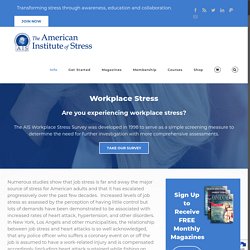
It is not the job but the person-environment fit that matters. Some individuals thrive in the time urgent pressure cooker of life in the fast lane, having to perform several duties at the same time and a list of things to do that would overwhelm most of us — provided they perceive that they are in control. They would be severely stressed by dull, dead-end assembly line work enjoyed by others who shun responsibility and simply want to perform a task that is well within their capabilities. The stresses that a policeman or high school teacher working in an inner city environment are subjected to are quite different than those experienced by their counterparts in rural Iowa.
It is important to choose a suitable job.
Coping with stress at work. Everyone who has ever held a job has, at some point, felt the pressure of work-related stress.
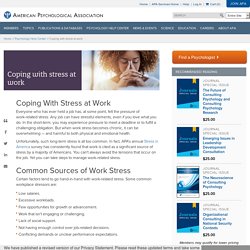
Any job can have stressful elements, even if you love what you do. In the short-term, you may experience pressure to meet a deadline or to fulfill a challenging obligation.
5 Emotion-Focused Coping Techniques for Stress Relief. Emotion-focused coping strategies. Putting stress into words: Health, linguistic, and therapeutic implications.
Self-Disclosure - Venting is helpful!
7 Emotion-Focused Strategies to Reduce Stress. Problem-focused coping strategies. Stress in the Workplace. Whatever your work demands, there are steps you can take to protect yourself from the damaging effects of stress, improve your job satisfaction, and bolster your well-being on and off the job.

When is workplace stress too much? Stress isn’t always bad. A little bit of stress can help you stay focused, energetic, and able to meet new challenges in the workplace. It’s what keeps you on your toes during a presentation or alert to prevent accidents or costly mistakes. But in today’s hectic world, the workplace too often seems like an emotional roller coaster. You can’t control everything in your work environment, but that doesn’t mean you’re powerless, even when you’re stuck in a difficult situation.
Stress and Cognitive Appraisal - Lazarus and Folkman. According to Richard Lazarus, stress is a two-way process; it involves the production of stressors by the environment, and the response of an individual subjected to these stressors.
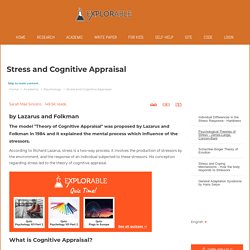
His conception regarding stress led to the theory of cognitive appraisal. What is Cognitive Appraisal? Lazarus stated that cognitive appraisal occurs when a person considers two major factors that majorly contribute in his response to stress. These two factors include: The threatening tendency of the stress to the individual, and The assessment of resources required to minimize, tolerate or eradicate the stressor and the stress it produces.
Cognitive Appraisal.







